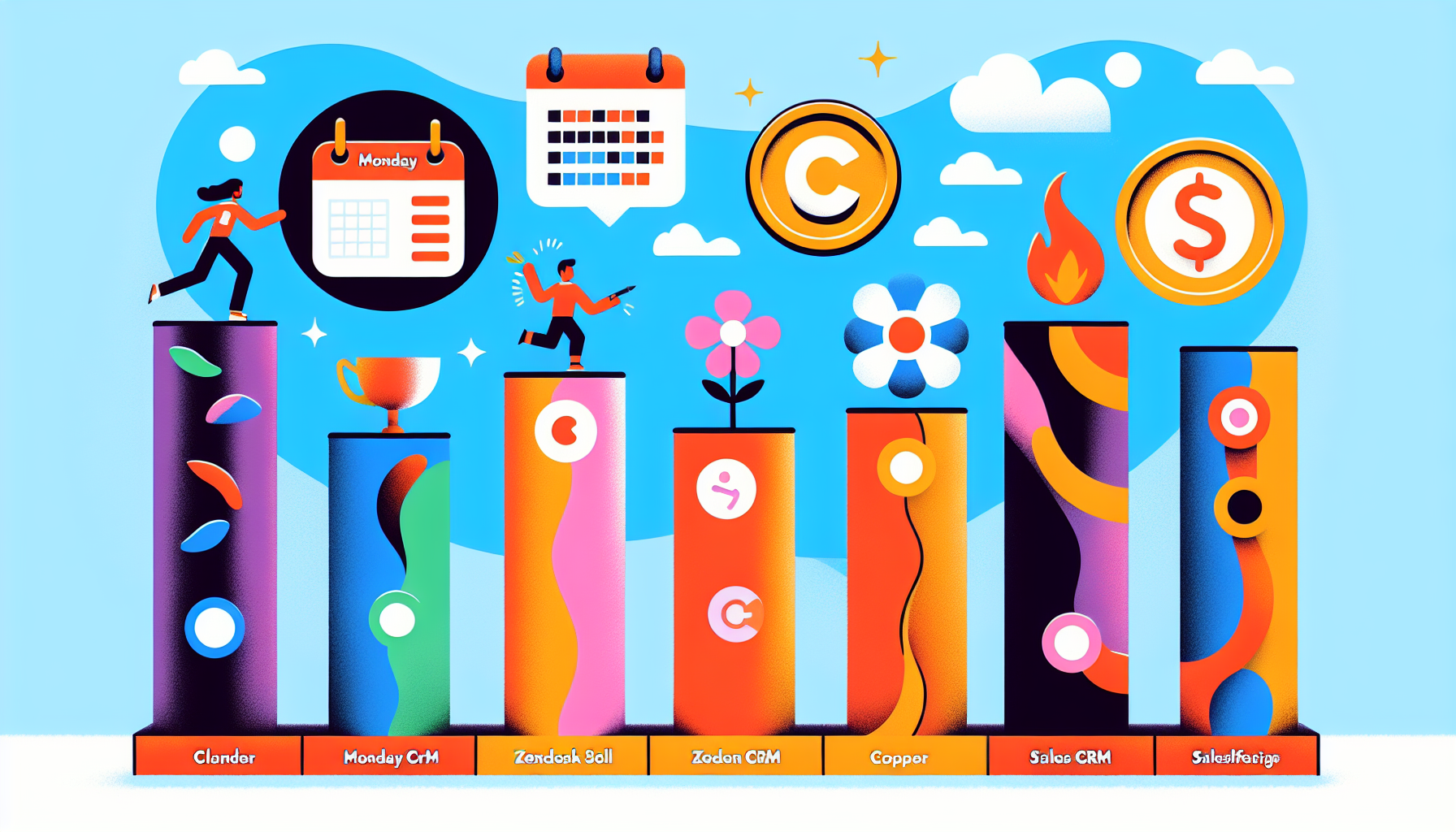Top Alternative to Salesforce for Diverse Business Needs in 2024

Choosing an alternative to Salesforce doesn’t mean compromising on quality or functionality. This guide provides an overview of CRM platforms that offer robust service at a more accommodating price point. Whether for a niche market like banking or a fast-paced startup atmosphere, you’ll find solutions here that cater to distinct business needs, all while promising a smooth transition from Salesforce.
Snapshot of CRM Champions

We begin with a brief overview of the CRM landscape where champions like:
- InvestGlass CRM
- monday sales CRM
- Zendesk Sell
- Copper CRM
- Agile CRM
- Salesflare
are making waves. These platforms offer unique advantages over Salesforce, striking a balance between specialized functionality, user-friendliness, and cost-effectiveness.
Best for banks, governments and fast-growing business – InvestGlass
Price: Varies based on plan
Specifications:
- Customizable CRM and Sales Automation
- Regulatory Compliance Tools
- Advanced Portfolio Management
- Secure Data Handling, including customer data
Pros:
- Tailored for banks, governments, and fast-growing businesses
- Robust compliance tools
- Advanced portfolio management features
- Ensures high levels of data security and privacy
Cons:
- May have a steep learning curve for non-tech users
- Costs can be high depending on the chosen plan
InvestGlass efficiently serves the specialized needs of banks, governments, and fast-growing businesses. Its customizable CRM capabilities and sales automation tools are tailor-made for the complex customer management needs of these sectors. Whether it’s navigating the intricate regulatory environment with robust compliance tools or managing client portfolios with advanced features, InvestGlass has it all. The platform’s emphasis on secure data handling is a boon for entities that require the highest levels of data security and privacy. InvestGlass also offers a portfolio management system which is unique compared with other CRM.
Despite its strengths, InvestGlass isn’t without its shortcomings. For one, non-tech users may find it challenging to navigate due to its extensive feature set. Additionally, while it offers a wealth of functionalities, the cost can be steep depending on the chosen plan.
Rating:
- Features: 4.5/5
- Ease of Use: 4/5
- Value for Money: 4/5
- Customer Support: 4.5/5
InvestGlass For Banks
Price: Varies based on plan
Specifications:
- Customizable CRM and Sales Automation
- Robust Regulatory Compliance Tools
- Advanced Portfolio Management
- Secure Data Handling
Pros:
- Tailored for the banking sector’s complex customer management needs
- Navigates the intricate regulatory environment with robust compliance tools
- Manages client portfolios with advanced portfolio management features
- Ensures high levels of data security and privacy
Cons:
- Can be overwhelming for users unfamiliar with banking regulations
- The complexity of portfolio management features might require additional training
InvestGlass emerges as a strong CRM software contender for banks. Its key features lead management to include:
- Highly customizable CRM system
- Sales automation tools
- Tailor-made for the complex customer management needs of the banking sector
- Robust compliance tools to navigate the intricate regulatory environment with ease
The platform’s advanced portfolio management features allow banks to efficiently manage client portfolios, automate their reporting and analytics, and provide personalized investment advice. Top it off with InvestGlass’s commitment to secure data handling and encryption to protect sensitive financial information, and you have a CRM platform that truly understands the nuances of the banking world.
However, the same features that make InvestGlass advantageous for banks can also pose difficulties. The platform’s robust regulatory compliance tools and complex portfolio management features might be overwhelming for users unfamiliar with banking regulations and practices. Additionally, mastering these features might require additional training, adding to the overall implementation cost.
Rating:
- Features: 4.5/5
- Ease of Use: 4/5
- Value for Money: 4/5
- Customer Support: 4.5/5
InvestGlass For Governments
Price: Varies based on plan Specifications:
- Public Sector CRM
- Robust Compliance and Reporting Tools
- Project Management Tools
- Secure Data Handling
Pros:
- Tailored for managing interactions with citizens, businesses, and other government entities
- Offers features for regulatory compliance and reporting
- Comes with project management tools for planning, executing, and monitoring public projects
- Ensures high levels of data security and privacy
Cons:
- May require significant customization to fit specific government processes
- Potential challenges in user adoption due to the complexity of government operations
In addition to its banking solutions, InvestGlass also provides a CRM platform specifically designed for governments. The platform offers the following features:
- Effective management of interactions with citizens, businesses, and other government entities
- Crucial features for regulatory compliance and reporting
- Ensuring transparency and accountability
InvestGlass’s project management tools are beneficial for planning, executing, and monitoring public projects and services. The platform’s commitment to data security is also vital for government agencies handling sensitive personal and national security information.
While InvestGlass has many benefits, it might necessitate substantial customization to fit specific government processes, which could add to the implementation time and cost. Additionally, the complexity of government operations might pose challenges in user adoption.
Rating:
- Features: 4.5/5
- Ease of Use: 4/5
- Value for Money: 4.5/5
- Customer Support: 4.5/5
InvestGlass For Fast-Growing Businesses
Price: Varies based on plan Specifications:
- Scalability
- Automation and Efficiency
- Customization
- Integration Capabilities Pros:
- Designed to scale with a business
- Offers automation tools to streamline operations and improve efficiency
- Highly customizable platform to adapt to evolving business needs
- Can integrate with other tools and systems for a cohesive technology ecosystem Cons:
- High-level features might be underutilized in smaller operations
- Customization might require technical expertise
InvestGlass supports fast-growing businesses with a scalable platform. The platform’s workflow automation and tools can streamline operations, reduce manual tasks, and improve efficiency, which is crucial for businesses experiencing rapid growth.
One of the stand-out features of InvestGlass is its highly customizable platform, which can adapt to the evolving requirements of fast-growing businesses. It also has robust integration capabilities that allow it to work seamlessly with other tools and systems, allowing businesses to maintain a cohesive technology ecosystem as they expand.
However, smaller operations may not fully utilize the wealth of features that InvestGlass offers. Additionally, while the platform is highly customizable, this might require technical expertise, adding to the overall cost of implementation.
Rating:
- Features: 4.5/5
- Ease of Use: 4.5/5
- Value for Money: 4/5
- Customer Support: 4.5/5
Best for Comprehensive Integration – Microsoft Dynamics 365
Price: Varies based on plan
Specifications:
- Seamless integration with Microsoft services
- Unified platform for business management
- Customer Engagement suite
- Predictive customer intent and lead generation features
Pros of using Microsoft Dynamics 365:
- Seamless integration with the full range of Microsoft services
- Offers a unified platform for business management, encompassing sales, marketing, customer service, finance, and operations
- Enhances customer relationship management and drives personalized experiences
- Equipped with features for predicting customer intent, lead generation, and customer relationship enrichment
Cons:
- Requires a learning curve, especially for non-tech users
- Pricing can be steep for smaller businesses
What sets Microsoft Dynamics 365 apart is its seamless integration with a broad array of Microsoft services. If your business is already utilizing other Microsoft products and requires a secure and robust CRM solution, Dynamics 365 is a solid bet.
The platform offers a unified platform for business management, encompassing sales, marketing, customer service, finance, and operations. It also comes with a Customer Engagement suite that enhances customer relationship management and drives personalized experiences. Equipped with features for predicting customer intent, lead generation contact sales call, and customer relationship enrichment, Dynamics 365 is a comprehensive CRM solution that delivers in spades.
However, as with any robust platform, Dynamics 365 has a learning curve, particularly for non-tech users. The pricing can also be steep for smaller businesses, so it’s crucial to weigh the cost against the benefits that the platform offers.
Rating:
- Features: 4.5/5
- Ease of Use: 4/5
- Value for Money: 4/5
- Customer Support: 4.5/5
Best All-In-One Platform – HubSpot Sales Hub
Price: Varies based on plan
Specifications:
- All-in-one platform for managing sales, marketing, and customer service
- Email marketing, ads software, marketing analytics, and 24/7 support
- The visual sales pipeline feature provides a clear and intuitive overview of the sales process, helping to track and manage opportunities effectively.
- Automation capabilities, including marketing automation
Pros of using this platform include:
- Connects marketing, sales, content management, and customer service into one platform
- Comes with email marketing, ads software, marketing analytics, and 24/7 support
- Offers a visual sales pipeline feature for efficient lead management
- Provides automation capabilities to streamline operations and reduce manual tasks
Cons:
- Can be overwhelming for new users due to the extensive feature set
- Subscription upgrade process can be complicated
HubSpot Sales Hub excels as a comprehensive platform for managing sales, marketing, and customer service. If you’re looking for a platform that can connect marketing, sales, content management, and even customer service teams into one cohesive system, HubSpot Sales Hub is worth considering.
The platform also comes with a range of features, including:
- Email marketing
- Ads software
- Marketing analytics
- 24/7 support
Its visual sales and pipeline management feature and automation capabilities help sales reps efficiently manage and track leads through the sales process and focus on strategic sales activities, ultimately improving their sales processes.
Nevertheless, HubSpot Sales Hub has certain drawbacks. The extensive feature set can be overwhelming for new users, and the subscription upgrade process can be complicated.
Rating:
- Features: 4.5/5
- Ease of Use: 4/5
- Value for Money: 4.5/5
- Customer Support: 4.5/5
Best for User-Friendly Sales Management – Pipedrive
Price: Varies based on plan
Specifications:
- User-friendly sales management tools with sales data analysis
- Scalable pricing plans
- Multiple integrations
- Essential customer service tools
Pros:
- Provides a clear view of deals and activities with user-friendly tools
- Offers scalable pricing plans to adapt to the varying size and needs of teams
- Can integrate with popular business apps
Cons:
- Usage limits across plans can restrict the number of open deals, active automations, custom fields, and reports
- In-app notifications can be bothersome when usage limits are breached
Pipedrive proves to be an excellent choice for sales teams in search of user-friendly sales management tools. The platform provides sales representatives with a clear view of deals and activities, ensuring ease of use for all team members.
One of the stand-out features of Pipedrive is its scalable pricing plans, which can adapt to the varying size and needs of teams. The platform also offers multiple integrations with popular business apps, enhancing workflow continuity and user efficiency.
However, Pipedrive isn’t without its constraints per user either. The usage limits across plans can restrict the number of open deals, active automations, custom fields, and reports. Additionally, the in-app notifications can become bothersome when usage limits are breached.
Rating:
- Features: 4/5
- Ease of Use: 4.5/5
- Value for Money: 4/5
- Customer Support: 4/5
Best for AI-Driven Insights – Freshsales
Price: Varies based on plan
Specifications:
- AI capabilities for deal advancement and customer relationship nurturing
- AI-powered predictive scoring
- Engagement chatbots
- Revenue forecasting
Pros of using this software include:
- Incorporates AI capabilities for deal advancement and customer relationship nurturing
- Offers AI-powered predictive scoring, engagement chatbots, and revenue forecasting
- Can integrate with popular business apps
Cons:
- High-level AI features might be underutilized in smaller operations
- May require additional training to fully utilize AI capabilities
Freshsales prominently features AI in its CRM platform. The platform incorporates AI capabilities for:
- Deal advancement
- Customer relationship nurturing
- AI-powered predictive scoring
- Engagement chatbots
- Revenue forecasting, also known as sales forecasting
The implementation of AI within Freshsales provides significant advantages like minimizing human errors and maximizing productivity in sales pipelines. However, smaller operations may not fully leverage the plethora of AI features that Freshsales offers. Additionally, while the platform is highly customizable, this might require technical expertise, adding to the overall cost of implementation.
Rating:
- Features: 4.5/5
- Ease of Use: 4/5
- Value for Money: 4/5
- Customer Support: 4.5/5
Best for Small Business Scalability – Zoho CRM

Price: Varies based on plan
Specifications:
- Free plan catering to small businesses
- Cloud-based scalability
- Extensive customization
- Integration with various tools
Pros:
- Provides a free plan and a free trial catering to small businesses
- Can scale seamlessly due to its cloud-based nature
- Allows for extensive customization without the need for coding skills
- Can integrate with a variety of tools like GSuite, Office 365, and more
Cons:
- The extensive feature set can be overwhelming for new users
- Customization capabilities might require additional training
Zoho CRM particularly excels in terms of scalability for small businesses. The platform provides a free plan catering to small businesses and can scale seamlessly due to its cloud-based nature. This combination of affordability and scalability has made Zoho CRM a favorite among small businesses.
One of the stand-out features of Zoho CRM is its extensive customization capabilities. The platform allows for extensive customization without the need for coding skills, and it can integrate with a variety of tools like GSuite, Office 365, and more.
However, new users might find the extensive feature set of Zoho CRM overwhelming. Additionally, while the platform’s customization capabilities are robust, mastering them might require additional training, adding to the overall implementation cost.
Rating:
- Features: 4.5/5
- Ease of Use: 4/5
- Value for Money: 4.5/5
- Customer Support: 4.5/5
Key Considerations When Choosing a CRM
Selecting the appropriate CRM platform can have a significant effect on a business’s profitability. To make an informed decision, it’s essential to consider key factors such as assessing business needs, comparing cost vs. value, and ensuring seamless integration with business tools.
Assessing Your Business Needs
Before choosing a CRM, it’s important to evaluate your own business intelligence requirements. This involves:
- Evaluating your current management tools’ effectiveness
- Understanding your customer lifetime value
- Reviewing your necessary CRM features or integrations
The value a CRM brings to business and its impact on deal management and customer relationships are instrumental in the search for Salesforce alternatives, including the perfect Salesforce alternative.
Ensuring the CRM complements the existing system without necessitating major changes is essential to avoid unnecessary disruptions.
Comparing Cost vs. Value
It’s important to balance cost and value when considering CRM options. This involves calculating the ROI of a CRM by considering both visible costs and potential hidden expenses. The total cost of implementing a CRM goes beyond the subscription fee to include expenses such as:
- research
- planning
- user training
- onboarding
- post-live support
- potential hardware updates
To maximize ROI, a CRM should:
- Offer necessary features at an affordable cost
- Integrate well with existing sales and marketing tools
- Come with good onboarding and support
- Remain transparent about pricing structures.
Ensuring Seamless Integration
Seamless integration is a significant consideration when selecting a CRM for contact management. This means that data entry into the CRM system should facilitate easy import/export of data and fit seamlessly into your current technological environment.
Implementing CRM integration should include:
- An assessment of ease for adding new integrations
- Accommodation of existing processes to minimize transition issues for the team
- Accounting for customization needs and budget considerations.
Summary
In today’s digital age, managing customer relationships effectively is paramount to business success. While Salesforce has been a dominant player in the CRM industry, diverse business needs require diverse solutions. This post has explored top Salesforce competitors that offer unique advantages, striking a balance between specialized functionality, customer support software ease of use, and cost-effectiveness.
Whether you’re a bank, a government entity, a fast-growing business, or a small business, there’s a CRM platform out there that’s tailored for your specific needs. From comprehensive integration with Microsoft services to user-friendly sales management tools, the full CRM solutions landscape is vast and varied. Ultimately, the key to choosing the right CRM lies in understanding your specific business needs, comparing the cost vs. the value, and ensuring seamless integration.
Frequently Asked Questions
Is Salesforce still the best CRM?
Salesforce is a top CRM for customization and integrations, making it the best choice for businesses with those specific needs. However, it may be more expensive than other options like HubSpot and Zoho, which offer similar features at a more affordable price point.
Who is better than Salesforce?
HubSpot may be a better fit for your needs, providing an all-in-one, user-friendly platform with seamless setup and integrating marketing, sales, and customer service hubs. Consider your specific needs, business size, and growth trajectory when comparing it to Salesforce.
Who is Salesforce biggest competitor?
Salesforce’s biggest competitors in the CRM Platforms category are Salesforce CRM, HubSpot CRM, and Microsoft Dynamics CRM. HubSpot and Microsoft Dynamics hold 5.10% and 4.52% market share, respectively.
What factors should I consider when choosing a CRM?
When choosing a CRM, consider assessing your business needs, comparing cost vs. value, and ensuring seamless integration to make an informed decision that suits your company best.
What are the benefits of CRM integration?
CRM integration offers a comprehensive customer view, streamlines processes, reduces manual tasks, maintains data accuracy, and prevents loss of sales opportunities. These benefits are crucial for optimizing business operations and enhancing customer relationships.